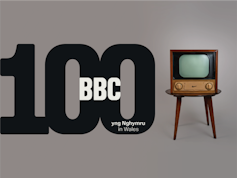Three months after the BBC’s first transmission from London, public service broadcasting in Wales began at 5.00pm on February 13 1923. The small studio above a cinema in the centre of Cardiff also served audiences in the west of England. This may explain the very limited amount of Welsh language material broadcast at the outset.
To ensure the British Broadcasting Company, as it was then known, was in no doubt about the existence of the native language and culture of Wales, Cylch Dewi (a group of cultural nationalists) arranged the first wireless broadcast of a Welsh-language religious service from Swansea on February 22 1925. By the mid-1920s, they were producing programmes of their own for the BBC, following consultations with E.R. Appleton, Cardiff’s station director.
Concerns about the effect of the wireless on life in Wales, however, were widespread in the early years of broadcasting. In 1927, a report commissioned by the Welsh Board of Education, entitled Welsh in Education and Life, was published. It contained a damning attack on the BBC:
Wireless is achieving the complete Anglicisation of the intellectual life of the nation. We regard the present policy of the British Broadcasting Corporation as one of the most serious menaces to the life of the Welsh language.
The BBC’s regional scheme had been devised by Peter Eckersley, the BBC’s chief engineer and Sir John Reith, the corporation’s director general. It included Wales as part of the so-called “west region”. This uneasy marriage with Bristol and the west of England from 1930 onward resulted in increased pressure from many parts of Welsh society (most notably the University of Wales and local authorities) for the BBC to recognise Wales as a nation with its own cultural and linguistic needs.
In 1932, one correspondent writing in the Plaid Cymru newsletter, Y Ddraig Goch, stated: “The majority of the material broadcast is alien to our traditions, damaging to our culture, and is a grave danger to everything special in our civilisation.”
With the opening of the Penmon transmitter on Anglesey in the north of Wales in February 1937, the corporation fully acknowledged Wales as a separate “region”. The historian John Davies argued the establishment of the “Welsh region” was an important concession to nationalist sentiment. He compared it with the disestablishment of the Church in Wales from the Church of England in 1920. These events enhanced a sense of nationhood and a belonging to an entity called “Wales”.

John Davies also argued the establishment of the Welsh region had wider repercussions: “In the history of BBC broadcasting in Wales, the importance of the victory won in sound radio can scarcely be exaggerated. All the subsequent recognition of Wales in the field of broadcasting (and, it could be argued, in other fields also) stemmed from that victory.”
From this point onward, the BBC played a major part in Welsh life. It informed, educated and entertained in Welsh and English, initially on radio and then, from 1952, on television.
The creation of BBC Cymru Wales came in February 1964 as a result of the report of the Pilkington committee on broadcasting. This was a government-appointed committee that considered the future of broadcasting in the UK. It laid the foundation for a regular television service in Wales. Ultimately, it led to the creation of national radio stations Radio Wales and Radio Cymru in the late 1970s, which continue to broadcast to this day.
Future
In December 2022, the BBC 100 in Wales exhibition opened at the National Museum Cardiff and will run until April. The exhibition to celebrate the corporation’s 100th anniversary was developed in conjunction with a group of young people to examine how the future may look for the corporation.
The global broadcasting landscape is ever-changing and the BBC is having to adapt to this. Challenges come from streaming services, other broadcasters and, not least, from a government that has called the very nature of public service broadcasting and the licence fee into question.
In December 2021, the Welsh Labour government and Plaid Cymru announced a new co-operation agreement, which outlined several policy commitments over the next three years. Among them was the creation of a new shadow broadcasting and communications authority, which would draw up plans for the devolution of broadcasting and communications powers to the Senedd. A panel has been established to consider the way forward in this area.
How this might work in reality is, as yet, undetermined. Which aspects of broadcasting would be devolved remains unclear, as are the possible implications for the BBC and other broadcasters. There is also uncertainty over whether the Welsh government would even be able to persuade the UK government’s Department of Culture, Media and Sport to devolve such powers.
There are many factors which have played a part in creating, defining and maintaining a feeling of “Welshness” in Wales, as well as a sense of belonging. There is no doubt about the part the BBC has played.
Penblwydd hapus, BBC Cymru.
Jamie Medhurst receives funding from Arts and Humanities Research Council; The Leverhulme Trust
This article was originally published on The Conversation. Read the original article.







